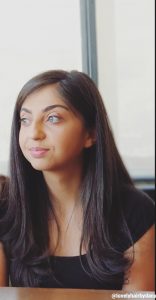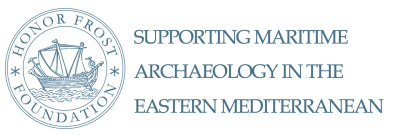Elissa Nader - 2021 - University of Southampton MA Scholar.
 I am a Masters Student at the University of Southampton, with a scholarship from the Honor Frost Foundation. I completed my BA in Archaeology at the Lebanese University. Then, I did a minor in Marine Science and Culture at the American University of Beirut with a scholarship from the HFF. Over the years, I have acquired extensive experience from being a trainee in multiple archaeological sites and projects. I was a member in archaeological excavations organized by the Lebanese University and the Balamand University. In addition, I participated in archaeological surveys organized by the Honor Frost Foundation, and the Italian-Lebanese Projects.
I am a Masters Student at the University of Southampton, with a scholarship from the Honor Frost Foundation. I completed my BA in Archaeology at the Lebanese University. Then, I did a minor in Marine Science and Culture at the American University of Beirut with a scholarship from the HFF. Over the years, I have acquired extensive experience from being a trainee in multiple archaeological sites and projects. I was a member in archaeological excavations organized by the Lebanese University and the Balamand University. In addition, I participated in archaeological surveys organized by the Honor Frost Foundation, and the Italian-Lebanese Projects.
Consequently, working in coastal surveys in the North and the South of Lebanon, helped me build a general view about various chronologies in archaeological sites. Moreover, I understood how the Lebanese sea can hold plenty of hidden potential and unexplored archaeology, and how we can relate coastal landscapes to human’s interaction with the sea. This sparked my curiosity and made me develop a passion for the maritime field.
My inspiration for becoming a maritime archaeologist was also influenced by Honor Frost’s attitude towards documenting, and publicizing underwater cultural heritage present in Lebanon. The current master’s program at the University Of Southampton is providing me with skills and development of a higher academic and professional level, which will allow me to study my country’s heritage in more depth.
2022 Update
I recently completed my MSc in Maritime Archaeology at the University of Southampton with the support of the Honor Frost Foundation. During my master’s, I gathered extensive experience in archaeological projects, conducting research, applying computational skills, and handling and preserving finds (dry and waterlogged). During my education, I acquired both diverse academic knowledge and practical skills related to working in the field of maritime archaeology. My course combined elements of theory and practical applications to heritage management. Theoretical approaches taught me to understand and analyse the maritime cultural landscape using various evidence and resources. Practical-based courses taught me how to design projects, write reports, prepare DBAs and research archives, and visualise and georeference data using photogrammetry and GIS. Additionally, my thesis revolved around public engagement of maritime heritage in museums, with Lebanon as the main case study. This thesis gave me a critical understanding of protecting and promoting marine heritage and strategies for improving public participation.
Activities and Conferences:
During this academic year and whilst in the United Kingdom, I participated in many activities as part of the program and on individual initiatives. During the masters, we visited Buckler’s Hard forest to learn about the importance of the environment in understanding the maritime landscape. We also learned how to perceive the trees from a carpenter’s perspective, which part of the tree can be transformed into which part of the ship.
Furthermore, in the Museums and Heritage Management module, we visited the Mary Rose museum in Portsmouth and the SeaCity museum in Southampton. From this visit, I learned the importance of the museum’s role in engaging the public with maritime heritage. Those two museums also use modern engagement techniques such as interactive displays and creative storytelling methods. This visit provided me with so much inspiration for promoting MCH.
I also did a placement module where I was assigned to research the Honor Frost Archives held at the Special Collections of the Hartley library in Southampton. As a result of this research, duplicates of the archives were displayed in the Archaeological Museum of Malta in an exhibition entitled ‘Honor’s Malta’ that was organized as part of the Under the Mediterranean II conference. In this placement, I learned how to research archives and the importance of grey literature in archaeological studies.
Concerning practical skills, I collaborated with a group of colleagues to survey the intertidal zone of Northam bridge. I generated maps and drawings of the area and documented a traditional boat hull that was at risk of being removed and thrown away. I practised writing a written scheme of investigation for surveying sites in this survey. I also practised recording sites using Photogrammetry and GIS. Furthermore, I volunteered for a day of excavation on the site ‘between the barrows’ with Dr Christopher Elmer in Andover. And I attended a training on conservation for waterlogged artefacts with the Nautical Archaeology Society and Historic England, with a sponsor from the HFF.
Finally, I attended various conferences organized at the university and outside of it. At the university, I attended the CAHO seminars, the Departmental talks, the Post-Graduate Research Archaeology Symposium, and the Under-Graduate Research Archaeology Symposium. Outside the university, I attended the Under the Mediterranean II in Malta, The 5th Maritime Archaeology Graduate Symposium at the Archaeology Research Unit in Nicosia, Cyprus, and the Maritime Archaeology Trust Annual General Meeting at the NOCS in Southampton. Those conferences were significant for me to form connections and learn about recent methodologies and trending topics in the field. They also helped me test my knowledge and share my thoughts with like-minded colleagues. At the MAGS conference, I represented the results of my dissertation. In addition to my educational background, higher education helped develop my core personal skills. The programs offered a challenge that allowed me to learn how to work well under pressure, develop time management, and enhance my communication skills by practising multiple languages (Arabic, French, English) and working as part of a multi-national team on various projects.
Capacity Building
The Honor Frost Foundation gave me this scholarship as part of their target in building capacities in Lebanon. This scholarship gave me the opportunity and the skills to study and preserve the maritime heritage of Lebanon at one of the leading universities in the field. This program made me well-rounded and ready to participate in any research and fieldwork activities that require a maritime archaeologist.
Before this degree, I completed a Minor in Marine Sciences and Culture at the American University of Beirut, which provided me with open water diving training and a fieldwork course where I learned diving and practised the applied underwater skills such as excavation, surveying and photogrammetry. I found great comfort and excitement in this new environment. Alongside my studies, I gained extensive, active experience from work opportunities and volunteering in the heritage sector. I was involved with several institutions such as the Lebanese University, the Balamand University, the Honor Frost Foundation, Sapienza University of Rome, Udine University, the Smithsonian museum, Blue Shield International, APSAD, and Biladi Association. I participated in archaeological surveys and excavations on prehistoric and medieval sites. Those sites existed in varied geographies, which helped me develop a vision of my country’s heritage (Lebanon). In these projects, I learnt the core skills of digging, surveying, and becoming familiar with archaeological tools and equipment. In a Tyre project, I acted as a supervisor on excavation and in finds processing. I also helped new trainees understand their chores and the working process.
Furthermore, after the August 4 harbour explosion in Beirut, I helped secure paintings, furniture, glass, ceramics, and Baghdadi ceilings in damaged buildings. The project gave me the skills to work in critical conditions, learn how to assess the damage, and handle fragile items while respecting the places’ privacy. Working with these various projects helped me develop a vast network with international organizations with which I still have good connections and collaborations that I wish to carry on with future work.
The abstract of my master’s dissertation:
In Lebanon, awareness and knowledge of maritime heritage are absent on the public level. This thesis evaluates public engagement concerning marine cultural heritage (MCH) in Lebanon through the primary resource of Museums. It interrogates the role that museums are playing in education and dissemination of the MCH. The research draws upon an extensive review of museum engagement, particularly concerning maritime displays and narratives. This consists of auditing and observing three museums in Lebanon: The National Museum of Beirut, the Archaeological Museum of the American University of Beirut and the Pépé Museum in Byblos. The audit includes comparing the museums’ physical display of maritime artefacts and the narrative representing them. The observation targeted the maritime-related artefacts, the layers of the maritime narrative representing them, and the method in which they are displayed and signposted. This approach made it possible to better understand the role of each museum with respect to communication with the public. Additionally, following the investigation, qualitative research was undertaken by interviewing the museums’ directors to learn about their perspectives, which added more depth to the understanding of the development of maritime heritage in the museums.
